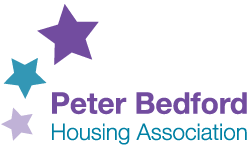Peter Bedford Housing Association was originally established in the late 1960’s to work with ex-offenders and we were a pioneer of supported housing. We now work with a much wider range of socially excluded adults but the philosophy of self-help and mutual support that guided our early development still very much underpins our work and sense of community today.
Who was Peter Bedford?
Peter Bedford was an 18th century social reformer and Quaker philanthropist who lived and worked among the people of Spitalfields in East London to help people help themselves. We took his name to acknowledge the support we received from the Bedford Institute Association when we began. Although we no longer have formal Quaker links, we are proud of our origins. The values of respect, self-help, mutual support, and participation are as strong now as they were when we began.
Timeline
1968: Michael Sorensen starts the ‘Peter Bedford Project’. While working as a prison welfare officer at Pentonville Prison, he notices that many men ended up reoffending after they are released from jail. Unable to find work, they struggle to rebuild their self-respect. Michael took a leave of absence from the post to test out his thinking that led to Peter Bedford Project.
‘…Our stratagem was to approach people who had accepted others low estimate of their worth and had written themselves off as unemployable and unhelpable. Instead of offering them help we wished to see what would happen if we asked them to help us with work we had to do…’ (Michael Sorensen).
With funding from the Quaker Bedford Institute Association (Quaker Social Action), Sorensen set up one house with six male ex-offenders. Sorensen’s emphasis was on self-organisation: He relied on tenants to make the house rules, cook, clean and function as a community). The project provided the participants with work as cleaners for the Department for Social Security offices.
‘…it’s not my organisation, it’s yours…’ (Michael Sorensen)
1971: Peter Bedford Housing Association is set up to develop longer-term housing with government funding.
Greater London Council offers the organisation a number of houses on Clissold Road for a peppercorn rent; the houses would otherwise have been demolished, as part of the North London slum clearances.
1972: Peter Bedford Housing Association sets up John Bellers Ltd, a trading company named after the Quaker reformer. The company provides work for tenants, servicing both external and internal cleaning contracts.
‘It is much more a charity to put the poor in a way to live by their own work, than to maintain them idle, as it would be to set a man’s broken leg, so that he might walk himself, rather than always carry him.’ (John Bellers)
1982: Legard Works purchased.
1985: We publish – ‘Free from old tags’, a history of the organisation from 1969-1985.
‘No neat answers or snappy slogans have emerged because day by day the trust has sought to understand and learn more about the immensely challenging issues that are revealed when schemes deal with real people
and not numbers on a board.’ (Timothy Cook, Chairman 1985)
2000: Our shop (called Bedfords) opens on the Holloway Road, Islington, providing opportunities for tenants to develop skills in retail and customer care.
2002: Stamford Works site opens in Dalston, Hackney.
2007: Launch of Starbox Cafe on Newington Green, in partnership with Islington Council and the Learning Disabilities Partnership. The café served fairtrade refreshments and provided work experience for people with learning difficulties.
2013: We refresh our mission and aims and establish a new forum for tenants and participants to contribute to the running of our services and the organisation. Our shop is re-furbished and re-launched (now called Outpost) selling high quality products made by tenants and participants in our creative enterprises.
2015: We sell Legard Works, leave Stamford Works and move to Kingsland Hub in Haggerston, Hackney, establishing a high quality learning centre and social enterprise coffee shop beside the main office. Community hubs at Isledon Road and Clissold Road open bringing support services up close to tenants. We also move the joinery and textiles workshops to a new Workshop in Hoxton
2016: We take over a new service – a high support mental health service in Islington. We open another Social Enterprise ‘The Coffee Shop’.
